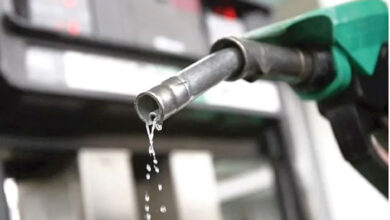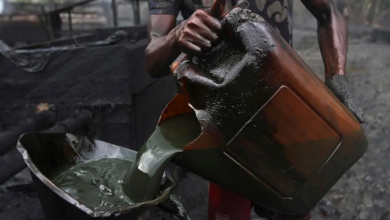Nigeria’s Crude Oil Output Increased By 185,000bpd to 1.18m Daily in May – NUPRC

•FG, partners ramp up production on problematic TNP line
•OPEC keeps liquids demand forecast unchanged for fourth month
•NMDPRA moves to add 4m barrels to Nigeria’s crude export storage
•Signs export terminal licences for NEPL, Belema
According to thisdaylive.com, after a dismal outing in April, newly-released data from the Nigerian Upstream Petroleum Regulatory Commission (NUPRC) yesterday, indicated that Nigeria’s crude oil output grew by 185,000 barrels per day to hit 1.183 million barrels daily output in May this year.
This emerged as the Nigerian Midstream and Downstream Petroleum Regulatory Authority (NMDPRA) yesterday issued export terminal licenses to NNPC Exploration and Production Limited (NEPL) and Belema Sweet Export Terminal Limited to add over four million barrels to Nigeria’s crude export storage capacity. Speaking at a signing ceremony in Abuja, the Chief Executive of the NMDPRA, Mr. Farouk Ahmed, said the development was in line with the Petroleum Industry Act (PIA) which empowers it to do so.
The Gbenga Komolafe-led NUPRC in its latest oil production figures, also showed that output (crude and condensate) from Nigeria’s problematic Trans-Niger Pipeline (TNP) increased considerably during the month from 3 million barrels to 3.7 million barrels.
While overall, oil production output grew 18.53 per cent compared to April 2023 when it fell to 998,602 bpd, total liquids in May was largely boosted by the increased flow through the TNP line which jumped 24 per cent.
Although total self-reported drilling by the NUPRC stood at 1.183 million barrels per day, but when condensate, which is excluded from the Organisation of Petroleum Exporting Countries (OPEC) computation is added, the data highlighted that output rose from 1.245 million bpd in April 2023, to 1.427 million bpd last month.
However, despite the over 18 per cent additional output in May, Nigeria’s expected crude oil volume was still a far cry from the 1.742 million bpd allocated to the country by the international oil cartel.
Already, OPEC has cut Nigeria’s production to 1.38 million bpd in 2024, due to the country’s inability to consistently meet its quota, but however said that the production figure could be upped to 1.57 million bpd if production improves by January 2024.
Also, the NUPRC data disclosed there was an improvement in the volume of crude oil production transported through the problematic TNP into the Bonny terminal.
Massive loss of production through the line last year drew criticism from top Nigerians, including the Chairman of Heirs Holding, Tony Elumelu and even the General Overseer of the Redeemed Christian Church of God (RCCG), Pastor Enoch Adeboye.
Considered as one of Nigeria’s biggest oil pipelines, the TNP aside other smaller oilfields in the Niger Delta, majorly moves crude from the Bonny Export Terminal. The TNP currently transports about 180,000 barrels of crude per day to the Bonny export terminal.
At the Nigerian Oil and Gas Opportunity Fair (NOGOF) in Bayelsa last month, the Chairman of Shell Companies in Nigeria, Osagie Okunbor, disclosed that the company in collaboration with partners, detected and removed 460 illegal connections to the line before it could be reused.
The lines are gradually returning on-stream after concerted efforts by the Nigerian National Petroleum Company (NNPC), Nigeria’s security agencies and local security groups in the Niger Delta to curb the menace of oil theft and vandalism which had continued to hobble Nigeria’s ability to raise output.
Other key terminals which yielded considerable volumes of crude in May, according to NUPRC, included Qua Iboe, where production of crude oil alone was ramped up from 1.9 million to 4.1 million barrels during the month.
Recall that the force majeure declared by Exxon Mobil, which operates the facility, affected the production on the asset after the workers of the company declared a strike in April bordering on welfare issues.
In addition, Forcados increased production volume from 4.8 million barrels to 6 million barrels during the month of May.
Meanwhile, OPEC in its Monthly Oil Market Report (MOMR) released yesterday, left its forecast for 2023 global oil demand growth steady for a fourth month, but admitted that the world economy faced rising uncertainty and slower growth in Q2 of 2023.
Global oil demand this year will rise by 2.35 million barrels per day, or 2.4 per cent, OPEC said, leaving it virtually unchanged from the 2.33 million bpd forecast last month.
“There are rising uncertainties regarding economic growth in the second half of 2023 amid ongoing high inflation, already elevated key interest rates and tight labour markets,” OPEC said in its report.
“Moreover, it is still unclear as to how and when the geopolitical conflict in Eastern Europe might be resolved,” it added, referring to the war between Russia and Ukraine.
NMDPRA Moves to Add 4m Barrels to Nigeria’s Crude Export Storage
The NMDPRA yesterday issued export terminal licenses to NEPL and Belema Sweet Export Terminal Limited to add over four million barrels to Nigeria’s crude export storage capacity.
Ahmed, said the development was in line with the PIA which empowers it to do so. Ahmed, explained that the portion of the law stipulates that nobody can build or operate a crude oil export terminal without an appropriate licence issued by the NMDPRA.
Describing the event as a milestone, he disclosed that the signing of the terminal licences for the two crude export terminals would add more than four million barrels capacity to Nigeria’s export storage.
“Our activities today are pursuant to the provisions of the PIA which has stipulated new provisions for the establishment of new export terminals.
“According to PIA Section 174(1) (a): Except in accordance with an appropriate licence issued by the Authority, a person shall not undertake the following activities with respect to midstream petroleum liquids operations.
“Establish, construct or operate a terminal or other facility for the export or importation of crude oil or petroleum products,” he stated.
According to him, the Authority has therefore processed and approved terminals establishment licences for NNPC Exploration and Production Limited (NEPL) to establish 2,179,747 bbls crude oil terminal at offshore Akwa Ibom State within the waters of the Exclusive Economic Zone Nigeria.
Also, he disclosed that Belema Sweet Export Terminal Limited now has the approval to establish a 2,000,000 bbls crude oil terminal at 20 nautical miles of Kula southern part of Exclusive Economic Zone Nigeria.
“Subsequent to these licences, terminal establishment notices are to be published in federal government gazette.
“The terminals are required to operate within the provisions of the conditions of the licences as contained in the licence documents,” Ahmed added.
He called on all potential investors to take advantage and put money into the business, describing it as a big opportunity for would-be investors.
In his remarks, the NMDPRA Secretary/Legal Adviser, Joseph Tolorunse, explained that part of the requirements for qualification for a licence was to be technically capable, have the financial resources and the presentation of a good business plan.
He stated that once these were examined and certified okay, businesses could then get the go-ahead to establish an export terminal.
Also speaking, the Founder and President, Belema Oil, Tein Jack-Rich, said the terminal has the capacity to generate over $11 billion for the federation, with over 400,000 barrels of crude oil per day.
In addition, he stated that it can store 8 million barrels of crude which will bring Nigeria to the global mark in terms of climate change being a hybrid export terminal , with renewable energy in mind.
He stated that the terminal was built within the corridors of four Oil Mining License (OML), which would make it easier to operate, noting that the terminal will be ready in about six months.
He noted that it would further reduce crude losses, disclosing that it would enable Nigeria have more transparency in terms of accounting for its oil production.





